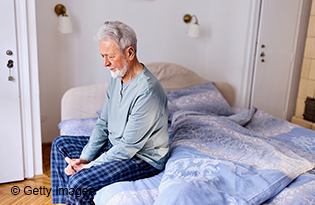Bowel habits as you age
6/6/2024 by Laura Kek, M.D., M.S.

Bowel habits vary from person to person, but everyone has their own “normal,” including time of day and frequency of evacuation. Some people may have bowel movements three times per day, while for others, it may be three times per week. Each person may also experience day-to-day changes in consistency and frequency based on their diet, hydration status, activity level, hormones and age.
Generally, individuals should have bowel movements regularly, without pain, discomfort or bleeding. It's important to know what's normal for you!
Often the terms 'diarrhea' and 'constipation' are mistaken for soft or hard stools. It's important to know the difference so that you become aware of abnormal changes in your habits and discuss these with your clinician. Occasional episodes of diarrhea or constipation may be within an individual's pattern of normal, but persistent symptoms should be addressed with your clinician.
Diarrhea
By definition, diarrhea is the passage of three or more loose, watery stools per day. Individuals may have looser stools, but passing formed stools multiple times per day is not considered diarrhea.
Diarrhea can be caused by many factors, including infection, inflammation, diet changes, food intolerances, irritable bowel syndrome, antibiotic use — and much more.
Constipation
Constipation is defined as having less than three bowel movements per week. These stools are often hard and difficult to pass.
Constipation may be caused by inadequate hydration, changes in diet, certain medical conditions — and much more.
What happens as we age?
As individuals get older, constipation may become more common. This occurs due to several reasons — decreased activity, inadequate fiber and fluid intake, decreased muscle tone in the abdomen and pelvic floor, slowed transit through the gut, certain medications and medical conditions.
Treatment options
- Eat regularly scheduled meals rich in fiber — such as whole grains, fruits and vegetables.
- Drink eight to ten (8-ounce) non-caffeinated beverages per day.
- Exercise regularly, as you are able.
- Start a fiber supplement, such as Metamucil or Citrucel. If adding a fiber supplement does not help, you may consider starting MiraLAX or Milk of Magnesia once daily.
- Consistency is key! Treatment should be part of your daily routine.
When to see your clinician
Treatments mentioned above do not help or they make your symptoms worse.
- Blood in your stool or on the toilet paper when you wipe.
- Black, tarry-colored stools.
- Weight loss, fevers, chills, abdominal pain.
- Persistent change in your normal bowel habits for two or more weeks, such as "pencil-thin" stools or new onset constipation or diarrhea.
Laura Kek, M.D., M.S., is a resident physician at Mayo Clinic in Rochester, Minnesota. She earned her medical degree and Master of Biomedical Sciences at Rosalind Franklin University of Medicine and Science in North Chicago, Illinois. She is interested in gastrointestinal health and patient education.
